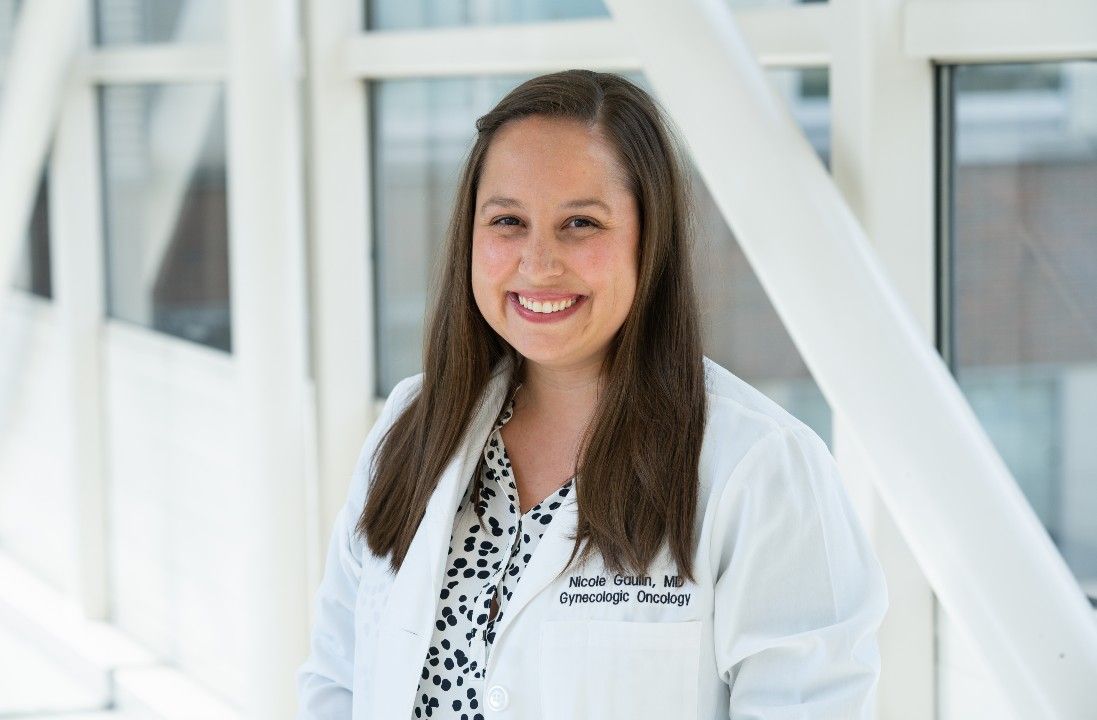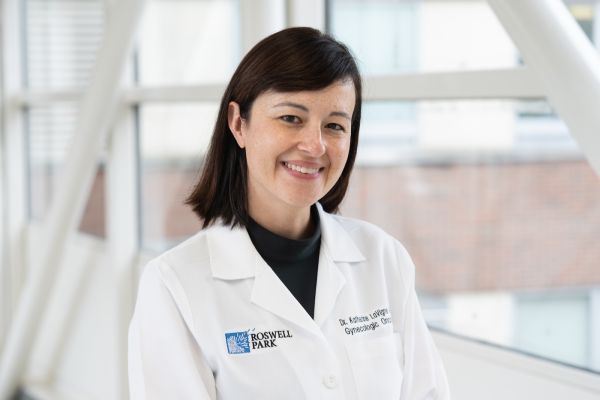There are more than 19,000 cases of ovarian cancer diagnosed in the United States each year, making it the second most common form of gynecologic cancer in the country. Unfortunately, due to its lack of distinguishing symptoms, and without a screening test currently available, many cases of ovarian cancer are diagnosed at a later stage, making treatment more complicated.
If you’ve been diagnosed with ovarian cancer, there are some important questions to discuss with your doctors before starting treatment to ensure you receive the best care. Nicole Gaulin, MD, a gynecologic oncologist at Roswell Park Comprehensive Cancer Center, has suggestions on important questions to ask your ovarian cancer surgeon before starting treatment.
How often do you perform ovarian cancer surgery?
The more frequently a surgeon performs a technique, the greater their expertise. “High-volume surgeons at ovarian cancer centers such as Roswell Park have better outcomes, better survival rates and higher rates of optimal cytoreduction,” indicating most, if not all, of the cancerous cells have been removed during the surgery, Dr. Gaulin says. “We also have unique ways that we can manage pain postoperatively to help support the patient’s quality of life. Going to a cancer center where your surgeon has frequent experience with ovarian cancer surgery directly impacts survival.”
Is my pathologist a specialist in this field?
A pathologist might be the most important member of a care team, even if they primarily operate behind the scenes. “At Roswell Park, we have a whole separate subdivision of pathologists who only work on gynecological cancers,” Dr. Gaulin says. “They’re experts in that area, just like our surgeons are experts in gynecologic surgery. If you’re coming from another facility, making sure your pathology is being reviewed appropriately by our gynecologic pathologists can make a difference. It’s not uncommon to see changes in diagnoses from outside pathology reviews. If you're coming to us with an outside diagnosis, confirming that diagnosis so that we have the correct treatment plan in place is really critical.”
You have time for a second opinion
A second opinion is the best way to ensure that your initial diagnosis is accurate and that all the best treatment options are available to you. At Roswell Park, we will ensure you get in without delay.
What will my treatment entail?
“When we treat ovarian cancer, it's typically a combination of chemotherapy and surgery. Radiation is not part of standard guidelines that drive upfront recommendations,” Dr. Gaulin explains. “The order of chemotherapy and surgery depends on a few things. It depends on the volume of disease, the disease distribution, which we can garner from our imaging and the patient's functional status, and how well they would be able to tolerate a major surgery. We tailor those to each patient.” A patient encouraged to undergo chemotherapy first will typically have three rounds of chemotherapy before new imaging is ordered to determine how effective the initial treatment was in shrinking the disease burden. “At that time, we will determine whether to perform the surgery now or if another three rounds of chemotherapy are required,” Dr. Gaulin says. “The alternative is to do surgery upfront, get as much of the cancer out as possible, and then do six rounds of chemotherapy after. It's not that one is a better prognosis or one course of treatment is better; your treatment will depend on what’s best for you and your cancer.”
Should I consider clinical trials?
Another benefit of being treated for ovarian cancer at Roswell Park is the potential access to clinical trials for treatments not yet available in other facilities, Dr. Gaulin says. “In the upfront setting, we do every so often get clinical trials for ovarian cancer that our patients can access with their initial treatment. These clinical trials are less common, but they certainly come up fairly regularly here. This gives patients the opportunity to receive tomorrow's treatment today,” she says. “The other side of that is that you may qualify for something upfront, but with ovarian cancer, 75 to 80% of our patients will have a recurrence after their upfront treatment. Having options for sliding right into clinical trials after that recurrence is diagnosed and really being able to do all of that expeditiously is helpful.”
Why does being treated at an NCI-designated cancer center matter?
“Simply put, we can help patients have better outcomes. It means better multidisciplinary care and better support for patients. Having a designation from the National Cancer Institute, especially our recent rating as ‘Exceptional,’ speaks to the expertise of our entire team, from pathologists to surgeons to chemotherapy technicians,” Dr. Gaulin says. Another aspect that sets Roswell Park apart is the possibility that your tumor will be reviewed by a multidisciplinary tumor board. “We all meet, all of the attendings, the fellows, pathology, radiology, radiation and we all review the case. It's like getting built-in second, third, fourth, fifth opinions all at once that help us guide treatments for our patients. Having that expertise there when I present a patient, I can say to the pathologist, ‘Well, she had X, Y, and Z,’ things that may impact how they look at it. We have a discussion about it.”
Ovarian cancer is an area of expertise for the team at Roswell Park, Dr. Gaulin says. “You’re going to get the correct care that’s right for you. We will take care of everything. You don’t have to worry about your team saying different things. All you have to do is focus on being a patient.”




